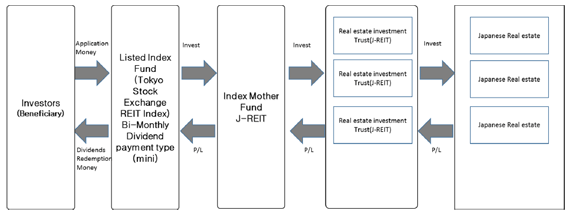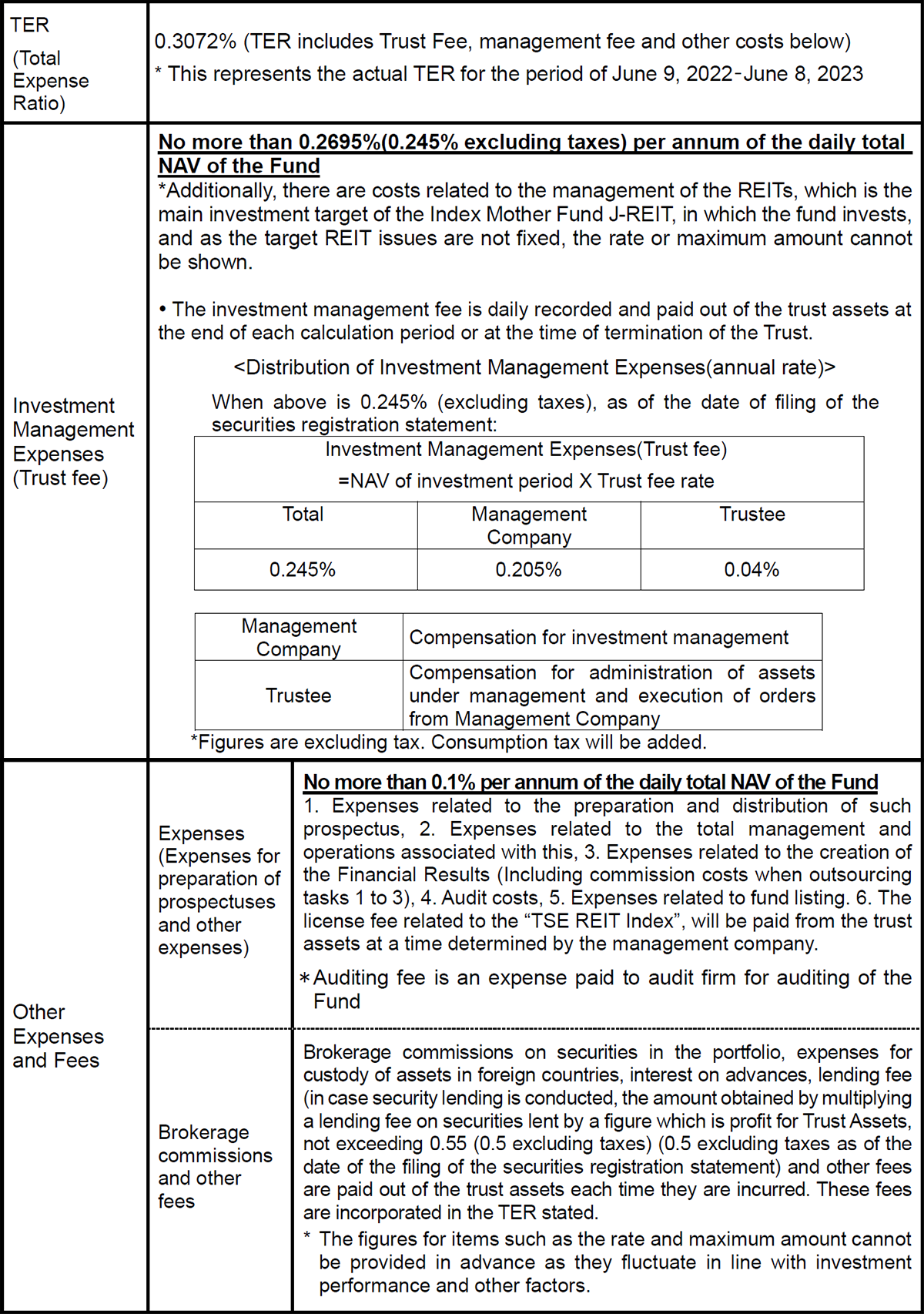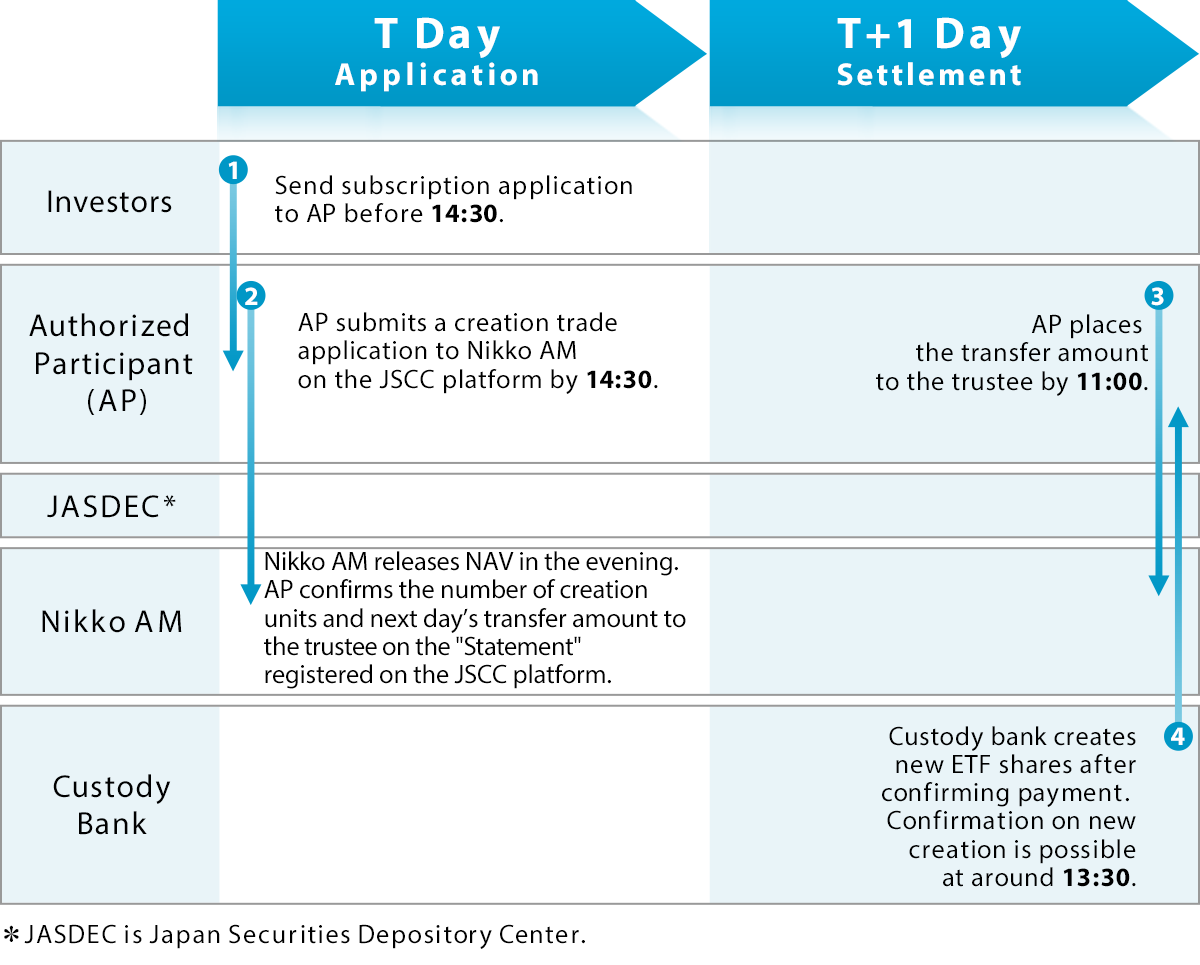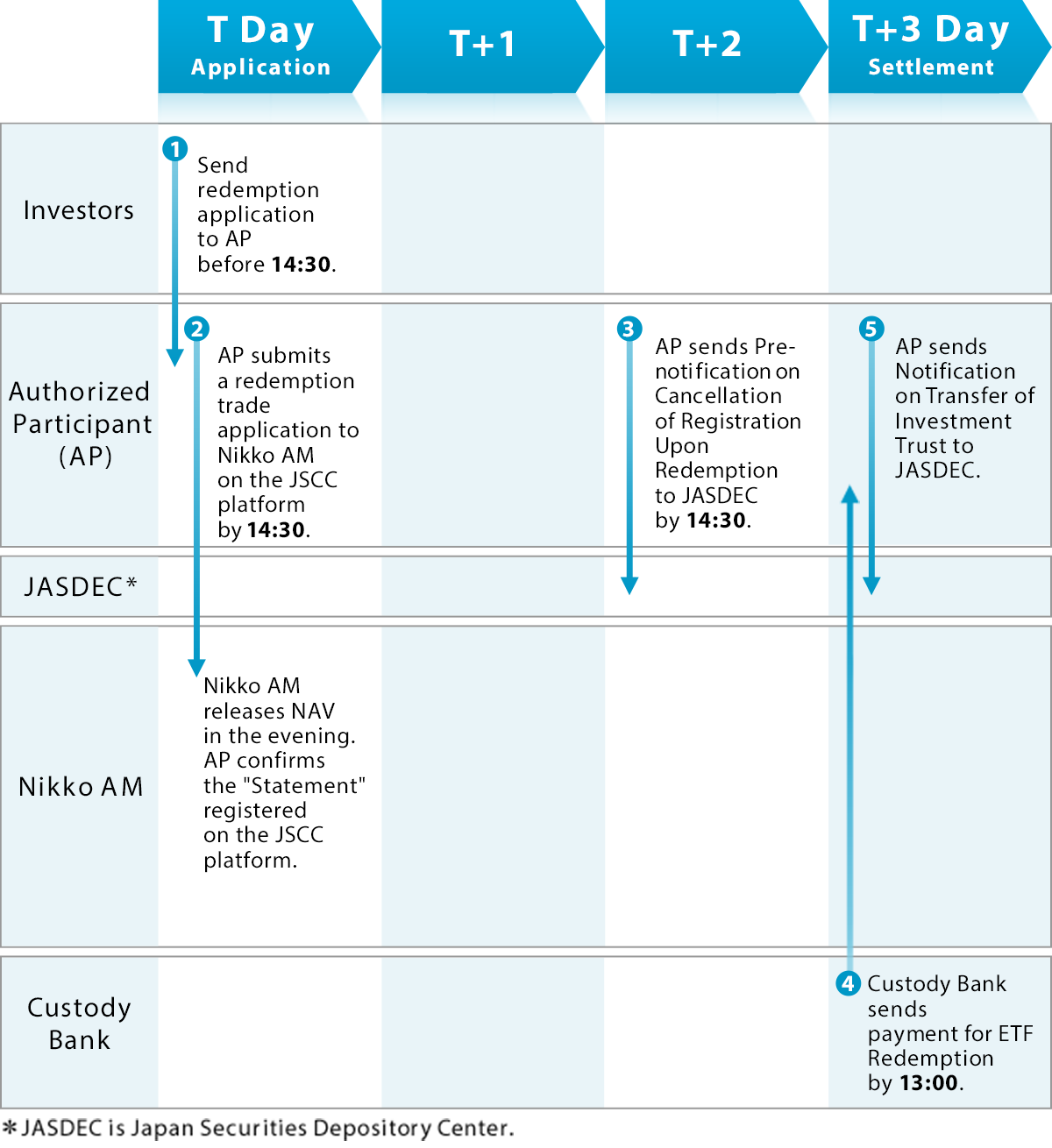On September 1, 2025, Nikko Asset Management Co., Ltd. will change its name to Amova Asset Management Co., Ltd.
The Fund invests primarily in Real Estate Investment Trust (REIT) securities through investment in the mother fund, and structures its portfolio in accordance with the calculation method of the Tokyo Stock Exchange REIT Index, and aims to closely link the NAV of the fund with the movement of the Index.
Key information
| Name: | Listed Index Fund J-REIT (Tokyo Stock Exchange REIT Index) Bi-Monthly Dividend Payment Type (Mini) | |
| Code: | 2552 |
Net Asset Value and Performance
Structure of the Fund

*The benchmark of the Fund is the TSE REIT Index, and the benchmark for the main investment
target "Index Mother Fund J-REIT" is the TSE REIT Index (including dividends).
The movement of the benchmarks of the two funds differ depending on the presence or absence of
dividends.
| Fund Name | Listed Index Fund J-REIT (Tokyo Stock Exchange REIT Index) Bi-Monthly Dividend Payment Type (Mini) Open-end Investment Trust/Domestic/REITs/ETF/Index type |
| Listed Exchange | Tokyo Stock Exchange |
| Issue Code | 2552 |
| Targeted Investments | This fund aims to achieve investment result that is linked to the movement of the Tokyo Stock Exchange REIT Index. |
| Date Listed | June 4, 2019 |
| Exchange Trading Unit | 1 units |
| Trust period | Unlimited (launch date: June 3, 2019) |
| Computation Period | Annually, 9 Feb - 8 Apr, 9 Apr - 8 Jun, 9 Jun - 8 Aug, 9 Aug - 8 Oct, 9 Oct - 8 Dec, 9 Dec - 8 Feb of following year. |
| Closing Date | On the 8th of February, April, June, August, October and December of each year.
*The first closing will be August 8, 2019. |
| Dividends | As a general rule, the full amount of dividends and other income arising from the trust assets is distributed after deduction of expenses. *There is no guarantee on the payment or the amount of dividend. |
Fund Expenses
■Expenses to be borne directly by investors
| Subscription Fee | Independently set by Distributors * Please contact your Distributor for further information. * Subscription Fee is compensation for explanation and information providing about the Fund or investment environment, and is also including expense of clerical processing of the subscription. |
Redemption Fee | Independently set by Distributors * Please contact your Distributor for further information. * Redemption Fee is compensation for clerical processing of the redemption. |
| Amount to be Retained in Trust Assets | None. |
■Costs paid indirectly by the customer for the trust assets (paid from the fund)
| TER (Total Expense Ratio) |
0.3091% (TER includes Trust Fee, management fee and other costs below) |

The total amount of expenses of the Fund to be borne by investors varies according to holding length and investment status, and thus cannot be shown.
Investment Restrictions
|
Trustee Companies
|
The Tokyo Stock Exchange (TSE) Real Estate Investment Trust (REIT) Index is a weighted aggregate market price type index for all Real Estate Investment Trusts (J-REIT) listed on the Tokyo Stock Exchange. The Index is calculated, with the base date set as March 31, 2003 (closing price). It assumes the aggregate market price on that day to be 1,000, by creating an Index for aggregate market price after the above base date.
If and when necessary, the aggregate market price is modified to avoid being affected by non-market factors such as capital increase, new listings and delistings, etc., to ensure Index continuity.

Further Information
Japan Exchange Group (JPX)
Japan Exchange Group publishes summaries and lists of the ETFs, as well as other valuable information on their website.
S&P Global
- Listed ETF iNav
Please click this link to see the iNAV.
*Link to external sites.
Copyright of the Tokyo Stock Exchange REIT Index
The TSE REIT Index Value and the TSE REIT Index marks or trademarks are intellectual property rights owned by JPX Market Innovation & Research, Inc. or its affiliates (hereinafter, “JPX”). All rights and know-how relating to the TSE REIT Index, including calculation, publication and use of the TSE REIT Index Value as well as those relating to the TSE REIT Index marks or trademarks belong to JPX.
JPX reserves the rights to change the methods of calculation or publication, to cease the calculation or publication of the TSE REIT Index Value or to change the TSE REIT Index marks or trademarks or cease the use thereof.
JPX makes no warranty or representation as to the results derived from the TSE REIT Index Value and the use of the TSE REIT Index marks or trademarks, and as to the TSE REIT Index Value on any particular day.
JPX does not guarantee the accuracy or completeness of the TSE REIT Index Value and data contained therein. Further, JPX shall not be liable for the miscalculation, incorrect publication, delayed or interrupted publication of the TSE REIT Index Value.
This Fund is not in any way sponsored, endorsed or promoted by JPX.
JPX does not bear any obligation to give an explanation of this Fund or advice on investments to any purchaser of this Fund or to the public.
JPX does not consider the needs of Nikko Asset Management or the Fund's purchasers in the component stocks or calculation of the TSE REIT Index Values.
Including but not limited to the foregoing, JPX shall not be responsible for any damage resulting from the creation, sale and promotion of this Fund.
- 22 July 2025 — Earnings Report for Fiscal Year ended June 2025
- 21 Jan 2025 — Earnings Report for Fiscal Year ended Dec 2024
- 22 July 2024 — Earnings Report for Fiscal Year ended June 2024
- 19 Jan 2024 — Earnings Report for Fiscal Year ended Dec 2023
- 21 July 2023 — Earnings Report for Fiscal Year ended June 2023
- 20 Jan 2023 — Earnings Report for Fiscal Year ended Dec 2022
- 22 July 2022 — Earnings Report for Fiscal Year ended June 2022
- 21 Jan 2022 — Earnings Report for Fiscal Year ended Dec 2021
- 21 July 2021 — Earnings Report for Fiscal Year ended June 2021
- 21 Jan 2021 — Earnings Report for Fiscal Year ended Dec 2020
- 22 July 2020 — Earnings Report for Fiscal Year ended June 2020 (9 Dec 2019 - 8 June 2020)
- 21 Jan 2020 — Earnings Report for Fiscal Year ended Dec 2019 (9 Aug 2019 - 8 Dec 2019)
- 20 Sep 2019 — Earnings Report for Fiscal Year ended Aug 2019 (3 Jun 2019 - 8 Aug 2019)
This Fund can be applied for as a cash creation and a cash redemption at Authorised Participants in addition to the Tokyo Stock Exchange. When applying as a direct addition and exchange, please keep in mind that we cannot accept your application on the following dates:
For additional subscription and partial redemption applications, the fund can accept up to 3 billion yen per day.If the amount reaches the upper limit, applications for additional subscription and partial redemption cannot be accepted.Please contact authorized participant for additional subscription and partial redemption.
Authorized Participants
- ABN AMRO Clearing Tokyo Co., Ltd.
- BNP Paribas Securities (Japan) Limited
- Daiwa Securities Co. Ltd.
- Goldman Sachs Japan Co.,Ltd.
- JPMorgan Securities Japan Co., Ltd.
- Mitsubishi UFJ Morgan Stanley Securities Co., Ltd.
- Mizuho Securities Co., Ltd.
- Nomura Securities Co., Ltd.
- Societe Generale Securities Japan Limited
- SMBC Nikko Securities Inc.
Daily Creation and redemption are based on ETF's NAV calculated in early evening. Confirm non-tradable days by referring to trading calendar on our official homepage. Basket for creation is continually-updated on our official homepage.
Basically sell/buy underlying asset at last price of T day's market.
The flow chart below is showing the creation/redemption process for Nikko AM ETFs. Please note that transactions cannot be processed for days on which applications are not accepted.
Creation Flow for Cash Creation/Redemption Type ETFs

Redemption flow for Cash Creation/Redemption Type ETFs

Investors are not guaranteed the investment principal that they commit. Investors may incur a loss and the value of their investment principal may fall below par as the result of a decline in NAV. All profits and losses arising from investments in the Fund belong to the investors (beneficiaries). This fund is different from saving deposit.
The Fund invests primarily in REITs. The NAV of the Fund may fall and investors may suffer a loss due to a decline in stock prices or deterioration in the financial conditions and business performance of an equity issuer . In addition, in the case of investment in foreign currency assets, it may suffer a loss due to fluctuations in exchange rates.
Major risks are as follows:
Price Fluctuation Risk
Income and profits from the sale of real estate and real estate securitized products form the source of earnings for REITs, and REIT prices can fluctuate due to various factors including the circumstances surrounding the real estate, real estate market conditions, trends in long- and short-term interest rates and changes in the macroeconomic environment. Aging and changes in property conditions as well as the loss of or damage to properties from fire or natural disasters can also affect the price. Deterioration in dividends, financial conditions, earnings, and the market environment can cause a decline in the price of the REIT and a loss in the fund.
Liquidity Risk
In a situation where the market or trading volume is small, the price at which a security can be purchased or sold can be greatly influenced by the size of the transaction, giving rise to the risk that a transaction cannot be completed at the price expected from the market conditions, that a security cannot be sold as appraised, or that the transaction volume is limited regardless of the price level. This could lead to an unexpected loss.
Credit Risk
If Real Estate Investment Trusts become or are anticipated to become insolvent or to enter a state of holding excessive debt, there is a risk that the Fund will incur material losses.
Currency Fluctuation Risk
In a situation where foreign currency depreciates against the currency of the asset, it will have adverse effect on the price of foreign denominated asset, which can cause a decline in NAV.
Risk of Discrepancies between TSE REIT Index and NAV
This Fund seeks to match with NAV volatility with that of the TSE REIT Index; however, we cannot guarantee that movements will be identical to those of the Index for the following reasons:
- The potential market impact from the trading, etc., of individual issues when portfolio adjustments are made due to changes in the selected issues on the TSE REIT Index or capital transfers, or the costs borne by the Fund such as trust fees, brokerage commission, and audit costs, etc.
- The timing and amount of payment for the distribution of the Fund will not be completely the same as the distribution from the underlying stocks.
- Fees may be earned for securities lent.
- When derivative transactions such as futures are made, there may be disparity between the price movements of all or some of such transactions and that of the TSE REIT Index.
- Discrepancy between the NAV and the market prices on financial exchange.
This Fund is listed on and will be publicly traded on the Tokyo Stock Exchange; however, the market price of units will depend mainly on the Fund's demand, its investment performance, and how attractive it is to investors in comparison to alternative investments, etc. We cannot predict whether the units of this Fund will be traded at the market value, below the NAV or above the NAV.
*The factors that contribute to fluctuations in the NAV are not limited to those listed above.
Additional Considerations
- The provisions stipulated in Article 37-6 of the Financial Instruments and Exchange Act (the “cooling-off period”) are not applicable to Fund transactions.
- This Fund differs from deposits or insurance policies in that it is not protected by the Deposit Insurance Corporation of Japan or the Policyholders Protection Corporation of Japan. Furthermore, units purchased from registered financial institutions, such as banks, are exempted from compensation by the Japan Investor Protection Fund.
- When the Fund faces big redemption causing short term cash requirement or sudden change in the main trading market condition, there can be temporal decline in the liquidity of holding assets, resulting in the risks that Fund unable to trade securities at the expected market prices or appraised prices, or encounters limitation in trading volume. This may result in the negative influence on NAV, suspension of redemption applications, or delay in making payment of redemption.
Risk Management System
- The departments in charge of risk management and compliance, which are independent from fund management departments, evaluate and analyze risks and performance, risk management, and monitor the status of legal compliance.
- To maintain an appropriate management system, the departments in charge of risk management and compliance report and make proposals to the committees associated with risk management and compliance, and instruct fund management departments to take corrective actions as necessary.
*The system described above is as of the end of February 2019, and may be subject to change in the future.


